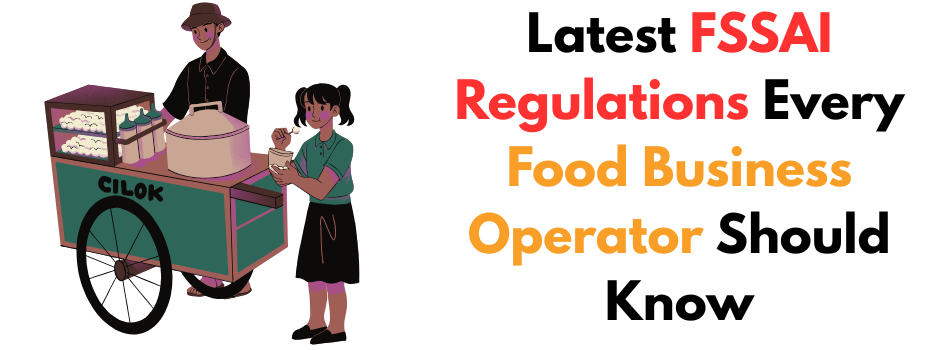With the growing development of food businesses in India, the quality of items has become the main topic of concern. To alert the FBOs and consumers, the government of India has introduced new rules and regulations. Furthermore, to improve the quality standards of food, it encourages the food businesses to adhere to FSSAI regulations. In the populated food markets, the FSSAI registration becomes critical. On the other hand, understanding the latest FSSAI set of rules and regulations has become essential for the new food business operators. Are you still unaware of the latest FSSAI guidelines? Let’s break down the page to know what the food management authority has posted that is about important food business operators.
What is FSSAI for Food Business Operators?
The Food Safety and Standards Authority of India (FSSAI) is a regulatory body. For the food business operators (FBOs), it serves as the licensing issuing authority and grants the mandatory FSSAI license. In broad terms, the FSSAI registration is the primary requirement to meet the regulations. Holding the compulsory food license demonstrates that FBOs have complied with food safety and quality benchmarks. The legal authorization before starting the food business is a legal requirement in India. The entities that deal with food manufacturers, processors, storers, distributors, or food sellers must be authorized by the FSSAI regulatory body.
FSSAI Rules for New Food Operators in India
The FSSAI food license is the gateway to entering the growing Indian food industry. The food license is more than a piece of paper. Are you a food seller or the owner of a restaurant? Then you are also subject to compulsory registration. As a newcomer in the food market as a food business operator, you should follow these guidelines set by FSSAI:
Compulsory Food License/Registration
Whether a BFO is subject to licensing or registration depends on the business size and type. There are three types of license/registration. Generally, the state and central governments are responsible for issuing licenses to FBOs.
Display License Numbers
It is mandatory to display the food license number on the business premises. If operators sell packaged foods, the display must be on the package.
Apply for Renewal
A food license is valid for a specific timeline. To maintain an active license number, FBOs are required to apply for renewal before the expiration date. To avoid a fine, apply for renewal in advance.
Maintain Hygiene
Maintaining the cleanliness in food areas, including storage and other food zones, is important. For the food preparation, operators must use safe and clean water.
Guide Employees
Employees must be aware of the strict hygiene practices. Using the hairnets and gloves in kitchens is mandatory.
Proper Waste Management
Facilitate a proper system for managing both wet and dry waste.
Implement FSMS
If your food zone required it, implement the Food Safety Management System (FSMS). Otherwise, businesses can follow the concept of the Hazard Analysis and Critical Control Point (HACCP) plan.
Food Temperature Management
To manage the accurate temperature of food, facilitate the fridge system.
Food Record Keeping
FBOs must accurately maintain records of purchases, production, sales, and recalls of food.
Label Declarations on Package
On the food package, display the important declarations, which include the ingredient list, nutrition facts, the veg/non-veg logo, and the food license number. Mentioning the packaging and expiry date is further important.
Right Advertising
Avoid misleading consumers. Advertising false or unsubstantiated claims related to food nutrition can lead to legal actions.
Newest FSSAI Updates for Food
After a recent Rajasthan case where an official investigated the pesticides and insecticides in product items, FSSAI brought the stringent rules. The authority is proposing new labeling benchmarks for the dairy items.
“Ayurveda Aahara” has been introduced as a new kind of business. These businesses are subject to the FoSCoS FSSAI registration. Now, the portal allows a new kind of business for licensing and registration.
The Growing of Technology for Food Safety
The new technology innovation is making food management easier. With the innovation, food safety can be enhanced more accurately. The food x-ray technology is advancing, which is designed to identify defects and packing issues. Apart from food packaging and other aspects, the nutritional value of crops is becoming a concern. The new study reveals that climate change is reducing the nutritional value of crops.
Closure | FoSCoS FSSAI New Guidelines for Food Operators
Various recent events forced the FSSAI regulatory authority to implement the stringent rules and regulations. Whether you are new or established, meeting food safety, quality, labeling, and packaging benchmarks is mandatory. Meanwhile, FSSAI licensing is not a legal formality but showcases the commitment to public health and safety. Stay updated with the new guidelines by FSSAI for food.

